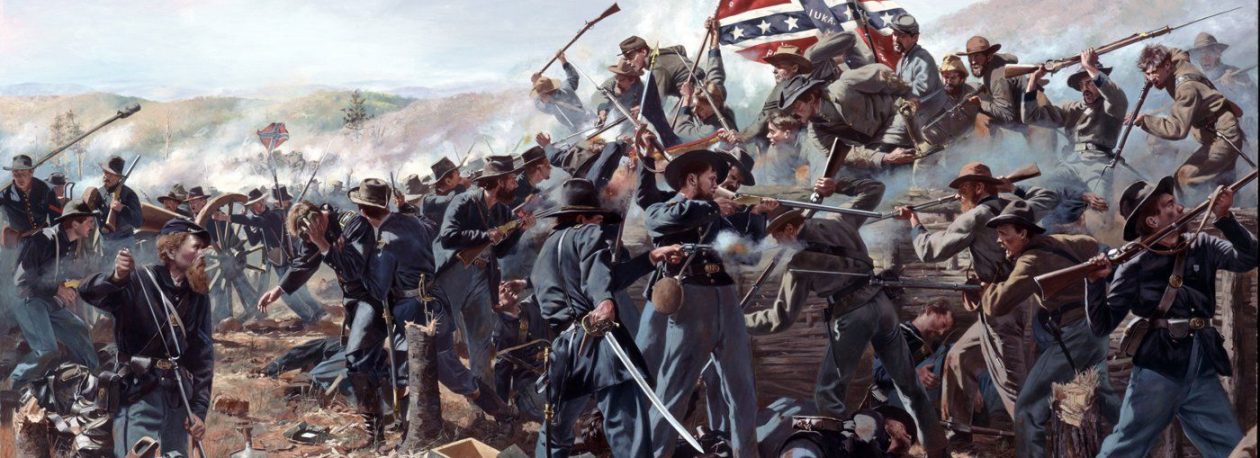
These seventeen letters were written by Arthur Henry Dutton (November 13, 1838 – June 5, 1864) while a cadet at West Point Military Academy and shortly thereafter. A trained military engineer and high graduate of the Academy, he served on the staff of General Mansfield in Washington at the beginning of the war, and then had charge of the defenses of Fernandina, Fla., until he became colonel of the 21st Connecticut regiment on 5 September 1862. While on duty in North Carolina with his regiment, he served as chief of staff to Maj.-Gen. Peck, and subsequently held a similar position upon the staff of Major-Gen. W. F. Smith. After the battle of Drury’s Bluff, in which he greatly distinguished himself, he was placed in command of the 3d brigade. While reconnoitering with his brigade in the neighborhood of Bermuda Hundred on 5 June 1864, he came upon the enemy strongly entrenched and almost hidden from view. Being, as usual, on the skirmish line, he was mortally wounded in the beginning of the engagement.
I have searched the internet for any letters archived and/or transcribed by Arthur and have not found any, which seems incredible given that he was a prolific writer and had many correspondents.
Among his correspondents, surprisingly, was Hattie Tyng (1840-1909), the daughter of Rev. Dudley Tyng (1806-1879) and Sarah Haynes (1805-1873). Hattie was only 20 years old and living with her parents in Fountain Prairie, Columbia county, Wisconsin when Arthur addressed his first letter to her. They had never met though she had gained some notoriety for her poems and other works published in the Home Journal [a NYC publication by N. P. Willis] and the New York Mercury, as noted by Arthur. A newspaper article states that she was born in Boston, Massachusetts and was only fifteen when she had her first literary success in the form of poetry and prose. The Columbus Republican Journal [Wisconsin paper] gets credit for publishing several poems under her signature in 1855. She published more of her work in the Jefferson Banner under the name “Harriet.” Hattie started a nursery school in the village where she lived and by the time she was sixteen, she was a teacher in the schools for Winnetka, Illinois.
Hattie was married to Eugene Sherwood Griswold (1833-1909) on 26 December 1861 at Juneau, Wisconsin. her first edition of poems, Apple Blossoms, “was published in Milwaukee, by Strickland, in 1874; the second edition by Jansen, McClurg & Co., Chicago, in 1877. Some of these poems had been published previously, and others had not. A book review stated the book was one of rare merit, with an undertone of sadness, a refrain of grief and pathos, running through all her poems; but their lesson was always of patience and resignation and hope, rather than despondency or despair. Their sadness was that of life and of a woman’s heart, when it has known “a sorrow’s crown of sorrows,” such as is portrayed in ‘Three Kisses’.”
“In her time, none of the women poets of America wrote anything more widely known or popular of its class than Griswold’s short poem, “Under the Daisies” (1865) [Actually I found it published under her name in The Bridgton Reporter (ME) on January 17, 1862]. The song later appeared in an American periodical, extracted from its source by numerous newspapers throughout the country, but unfortunately the name of its author was not given. In this way, it was copied by almost the entire press of the US and England, and became immensely popular. Conjectures were made as to its authorship, and query editors of newspapers and magazines were appealed to, but the authorship of the poem had been lost. It was in this uncredited state that it fell under the attention of Harrison Millard, the composer, who in turn set it to music. As a ballad, it renewed its popularity. It later transpired that the authorship of the song belonged to Griswold. The discovery was brought to the attention of Millard, who wrote the author assuring Griswold that thereafter, her name would be attached to the ballad in all subsequent editions or forms in which it might be issued.” [Source: Helen Tyng Griswold]
In her later life she devoted her time to philanthropic causes.
Letters in the Collection
26 March 1860
5 April 1860
23 April 1860
16 May 1860
13 September 1860
22 September 1860
7 October 1860
25 October 1860
10 November 1860
7 December 1860
8 January 1861
2 March 1861
6 April 1861
3 July 1861
27 July 1861
October 1861
30 December 1861

Amazing! Col. Arthur Dutton was my cousin (he is among 22 cousins of mine who served in the 21st Conn. Volunteers).
I’ve always wanted to write an overdue book on Dutton, would love to hear from you.
Clay Feeter
York, Maine
clayfeeter@aol.com
LikeLike
How can I help you, Clay?
LikeLike
Hi Griff,
As I continue working on this either very large story or possibly book on cousin Col. Arthur H. Dutton, it would be helpful to know more about Hattie (much is available I know)… I can be reached at clayfeeter@aol.com … very grateful, Clay
LikeLike
Hi Griff,
Do you know if there are any of Hattie’s letters in reply to Arthur Dutton’s letters?
I’m working on a history presentation (and then a book) about Arthur and Hattie plays an important part of the story.
Thanks, Clay Feeter, Civl War Historian
clayfeeter@aol.com; (603) 209-4343
LikeLike
Griff,
Can I incorporate my cousin Col. Arthur H. Dutton’s letters into a presentation I’m working on for our Civil War round table group?
Would also like to use them in a book I hope to do on Dutton; now looking to see if Hattie’s reply letters exist.
Thanks, Clay
clayfeeter@aol.com
LikeLike
Absolutely. Just credit Spared & Shared and promise to share the information about my site with your CWT members. — Griff
LikeLike